Trust Me
Contents |
Host
Broadcast
Windfall Films for Channel 4, 11 to 14 December 2000 (4 episodes in 1 series)
Synopsis
When Nick Bateman overtly attempted to manipulate housemates' votes on the UK version of Big Brother in Summer 2000, it was front-page news and merited mention in even the soberest of broadsheets.
His subsequent disqualification earned him the "Nasty Nick" sobriquet, instant B-list celebrity status and an instant career in the game show world with which he will always be associated. This is his first new role since then.
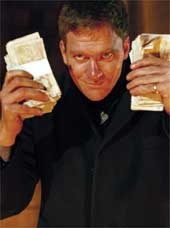 Would you trust this man? Nick Bateman holds the money.
Would you trust this man? Nick Bateman holds the money.This promises to be unlike any other game show. There are no questions and luck and chance don't come into it, whilst giving an insight into the human condition. So, a little bit like studying Coleridge at A-Level, then.
Basic premise: two groups or individuals of diametrically opposed types are shut away into two soundproofed booths. They don't know who each other are. Mr Bateman acts as a go-between who goes between the two booths (natch). The idea is he drip-feeds new information to each team about their opponents every time he visits.
When Nick arrives in a room, he tells the people in there what money is available. They then have three options.
 The options available in the first part of the game
The options available in the first part of the gameThey can take the cash for themselves, leaving the other booth with nothing and the game will end. Or, they could split the cash with the other booth and game will end. Or, they could go on, in which case more money is added and offered to the other booth, who then get information about whoever is in Box A.
A typical game might proceed as follows:
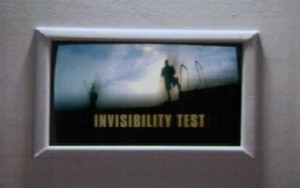 The Invisibility Test graphic
The Invisibility Test graphicStage 1: Nick takes £100 to room A. The room B inhabitants are asked the Invisibility test - "If you were invisible, would you pick people's pockets, watch people undress, eavesdrop on conversations about you or fight crime?" This is done by means of a plain text video screen, so the only information transported is the answer to the question.
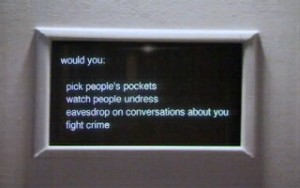 The choices of the Invisibility Test
The choices of the Invisibility TestThe result of the question is shown to team A. The room A inhabitants have three options: room A can keep the money and end the game, can split it with room B and end the game or continue the game, by handing a larger sum of money to room B.
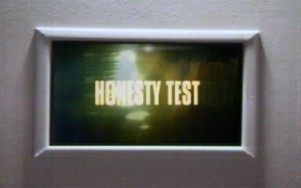 The Honesty Test graphic
The Honesty Test graphicStage 2: Nick takes £200 to room B. The room A inhabitants are asked the Honesty test - two yes/no questions, "Have you ever taken the credit for someone else's work?" and "If you found a cashpoint card and PIN in the middle of the street, would you use it?" Again, the only information transported are the answers to the questions, which are shown to the viewers and the room B inhabitants at the same time. The room B inhabitants have the same three choices: keep the money, split the money or go on.
(To our eyes, some of the stages are edited out here.)
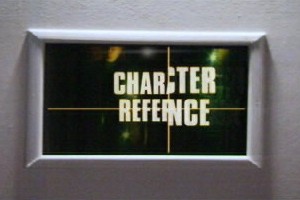 The Character Reference graphic
The Character Reference graphicStage 3: Nick takes £800 to room A. The room A inhabitants are shown a Character reference, a video about one of the room B inhabitants made by one of their close associates (a friend in game one, a parent in game two). Same choice.
Stage 4: Nick takes £1000 to room B. The room B inhabitants are shown a House visit video of Nick walking around the house of one of the room A inhabitants and describing it in detail. Same choice.
 Nick does his Loyd Grossman impression
Nick does his Loyd Grossman impressionStage 5: Nick takes £1200 to room A. The room A inhabitants are told the job of the members of team B. Same choice.
Stage 6: Nick takes £1400 to room B. The room B inhabitants are told the job of the members of team A. Same choice.
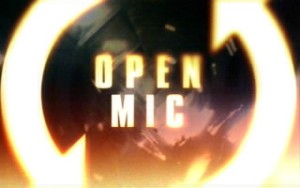 The Open Mic graphic
The Open Mic graphicIf Box B haven't taken or split the money by this stage then an endgame situation comes into play. Before that, the two boxes are given an Open Mic period, a minute or so where the two boxes can speak openly to each other. Then... armageddon begins. The two teams must choose independently by lights on their boxes as to whether to take the money or split the money, which now is worth £3000.
If both boxes decide to split the money then the game has a happy ending and both boxes win £1000. Now then, if one box decides to be really greedy and take the money whilst the other team trusts them enough to split it then their trust is misplaced - the greedy ones win the £3000 whilst the splitters win absolutely nothing. But there's a very clever catch - if both boxes are greedy then the money ran away whilst they were busy screwing each other... in other words, they both win nothing.
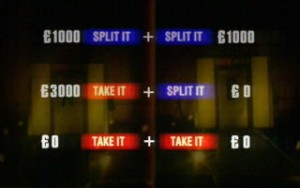 Known as the Prisoner's Dilemma, to mathmos
Known as the Prisoner's Dilemma, to mathmosPessimists - continue reading the red review.
Optimists - continue reading the blue review.
A - Pessimistic review
The elevator pitch for this show must have been "It's the Prisoner's Dilemma with Nick Bateman" which consigns it to the experimental slots that only Channel 4 runs late at night. The format is largely lifted from an area of mathematics called game theory, although to be fair it is possibly one of the most interesting areas of maths to choose.
The show's overall look is grungy, which may well work for American Gen X-ers, but it looks decidedly odd for a UK show. It's basically just a warehouse, and surely the fad for that kind of thing passed in the 80s with Network 7 and its ilk?
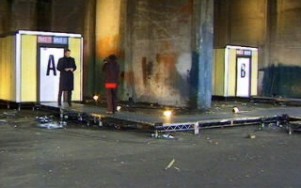 The sparse warehouse set
The sparse warehouse setThe use of Nick Bateman as a host in a show called Trust Me is strange given that he doesn't actually lie to the contestants at any stage. Possibly a missed opportunity?
The rate the money goes up seems a little erratic and random. We suspect the game is edited to fit one half of a programme (for there are two games per half hour episode) which means that some stages hit the cutting room floor - presumably so that the show doesn't run short if someone decides to run off with £600. Accordingly, some of the actual mechanics are perhaps a little duller than they should be.
And another minor gripe - after both teams have made their final choice, the players open a drawer containing a clunky metal box which will have their money in, if they've won any. This is actually something of a clumsy manoeuvre, and the reveal is quite slow and plodding.
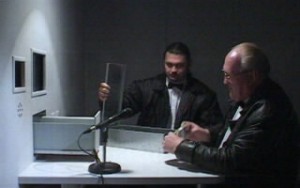 Two nightclub bouncers discover if they've won
Two nightclub bouncers discover if they've wonB - Optimistic review
The show's set is a clever mix of slick and grungy by plonking a fairly traditional isolation booth set in a sparse unkempt warehouse. The quality of the camerawork is reminiscent of Blair Witch. The on-screen graphics are cutesy without being too intrusive, and while going from room to room there are often really nice little computer game-style musical stabs to jolly things along.
The choice of Nick Bateman is a good way of getting an audience for a show that otherwise probably wouldn't pick up any decent ratings, and in any case he's actually quite a good host in his own right. His ad libs are somewhat better than the more stilted voiceovers, but overall he's done very well for someone who - other than 10 weeks being peered at by CCTV cameras - is otherwise completely unprepared for television.
 Nick eavesdrops onto the contestants' conversations
Nick eavesdrops onto the contestants' conversationsThe scheduling of near midnight seems fair enough, given the success of Late Night Poker. At the same time, it deserves to be seen by a larger audience than this scheduling implies.
The other thing is that it's a psychological game show, so it's certainly not going to be for everyone. It is strangely watchable. What we have then is a show that shouldn't work but in fact for some reason does.
C - And the result is...
If you asking us what we think, you'll have to pay us £1000 to find out. Oh, all right then, we're significantly more upbeat than downbeat. Technically, this is arguably no sort of way to run a game show. However, the show succeeds extremely well on execution in a remarkably unique way, and you feel stimulated after watching it.
For that reason if nothing else, it's a worthwhile addition to the schedules. Trust us.
Trivia
One of the contestants was Page 3 model Linsey Dawn McKenzie, who took £3000 away from a truck driver (SPOILER! Oh.).
Pictures
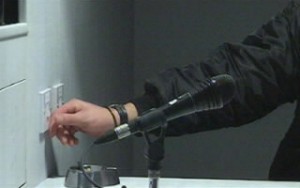 The final decision is made.
The final decision is made.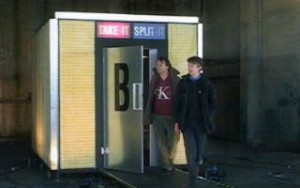 Contestants emerge from their cell.
Contestants emerge from their cell.See also
A few months later, the Prisoner's Dilemma later appeared as the endgame on the short-lived failure Shafted. Towards the end of the decade, it turned up everywhere. The end game on Golden Balls, a gratuitous bolt-on to The Bank Job, even popped up in Love Island. Only Trust Me made it the centrepiece of the programme.

